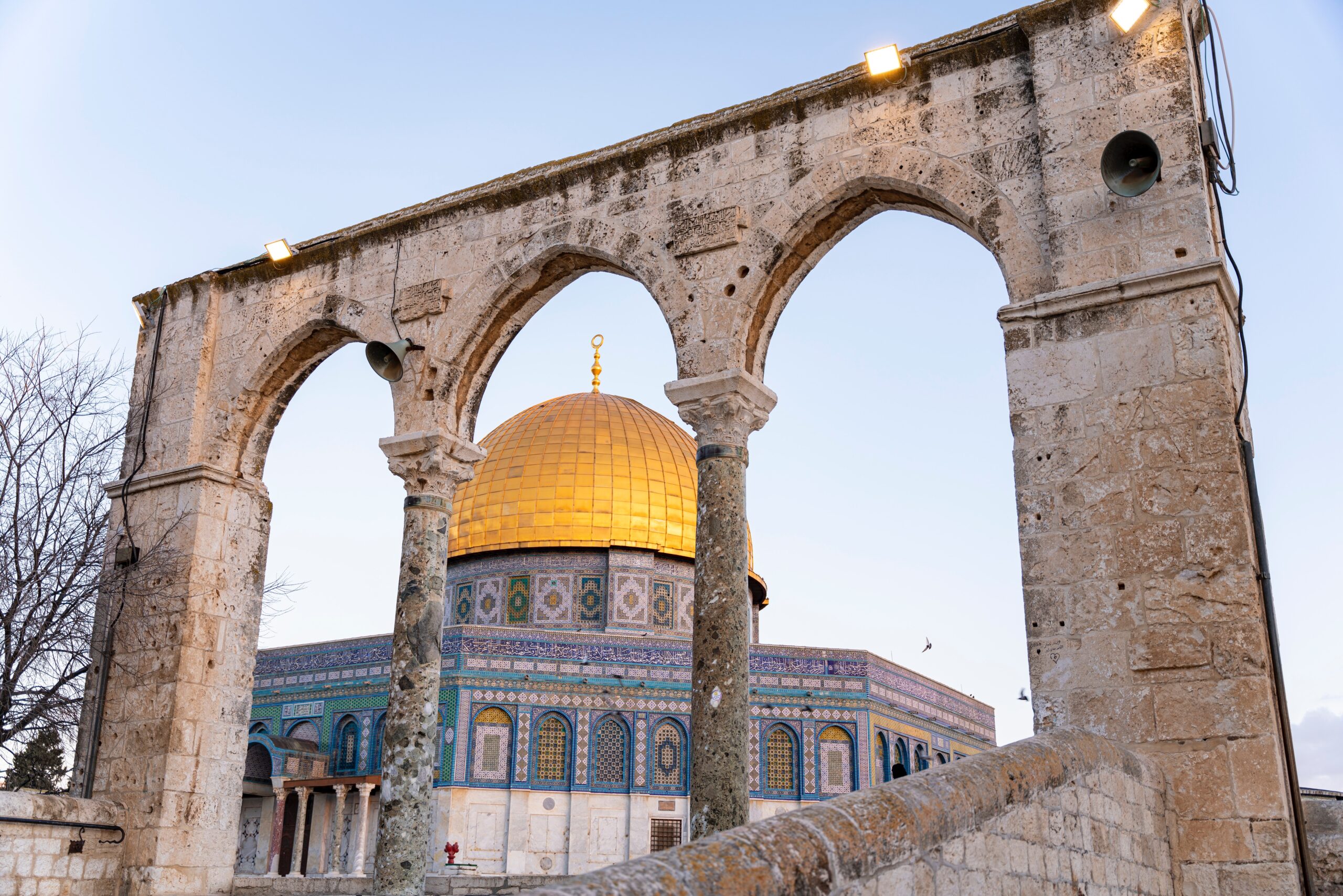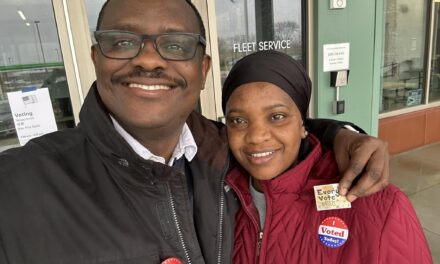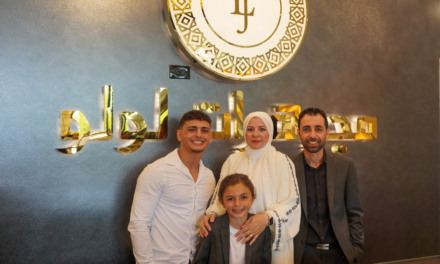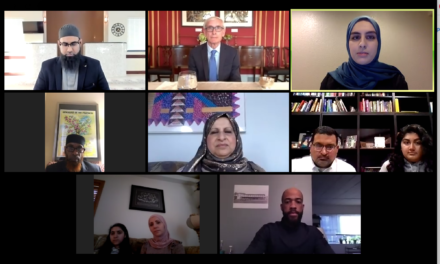Photo courtesy of Yasir Gurbuz
Al-Aqsa Mosque and the Dome of the Rock is the third holiest site for the world’s 1.8 billion Muslims. On April 4th, 2023, Israeli security forces stormed the Al-Aqsa Mosque firing stun grenades and using rifle butts to beat Palestinians who gathered to pray at the mosque during Ramadan.
Jerusalem is the world’s holiest city when measured by the devotion of the world’s largest monotheistic religions. The ancient, sacred land is home to Jews, Christians and Muslims. For centuries, Palestinian Jews, Palestinian Christians and Palestinian Muslims lived together, sharing their Arab culture and traditions and respecting each other’s places of worship.
On April 4, while Muslims around the world were observing their holiest month of Ramadan, Western Christians were observing Lent and Jews were preparing for Passover, Israeli police raided Al-Aqsa Mosque, part of the Haram al-Sharif, the compound that includes the Dome of the Rock. This is the third holiest site for the world’s 1.8 billion Muslims.
Photographs and videos shared around the world showed heavily armed Israeli soldiers firing tear gas and flash grenades into the mosque and beating and dragging male and female worshippers from the sanctuary. Many Muslims were injured during the assault and 400 of them were arrested.
Raids on Al-Aqsa by Israeli security forces are commonplace, occurring along with other provocations by extreme Zionists against Muslim and Christian Palestinians in Jerusalem. Anxiety has only grown under Prime Minister Benjamin Netanyahu’s extreme right-wing coalition government. His National Security Minister, Itamar Ben-Gvir, has been described in the Israeli press as “an integral member of the most extreme movements” within the coalition. He is in charge of security at Temple Mount.
The Wisconsin Muslim Journal posed several questions about the Al-Aqsa raid to three Jewish public intellectuals, Jodi Melamed, associate professor of English and Africana Studies at Marquette University, Milwaukee; Geoffrey Adelsberg, assistant professor of philosophy at Edgewood College, Madison; and Rachel Ida Buff, professor of history at University of Wisconsin-Milwaukee.
As a Jewish individual, what is your position on Palestinian human rights?
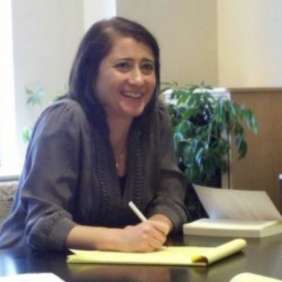
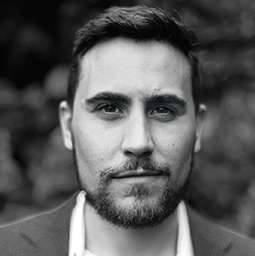
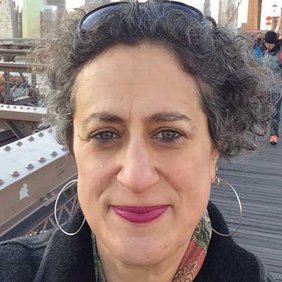
From left to right, Jodi Melamed, associate professor of English and Africana Studies at Marquette University, Milwaukee; Geoffrey Adelsberg, assistant professor of philosophy at Edgewood College, Madison, and Rachel Ida Buff, professor of history at University of Wisconsin – Milwaukee.
Jodi Melamed: Occupation is not my Judaism. Jewish supremacy in the apartheid state of Israel is not my Judaism. As a Jewish individual, I know there can be no tzedek (justice) and no shalom (peace) until Palestinian human rights are secure, and Palestinians are thriving—Palestinian dignity, stories, communities, kinships, and economies thriving – in their homelands.
Geoffrey Adelsberg: I am a strong Jewish supporter of Palestinian human rights and self-determination.
To me, being Jewish means fighting oppression wherever it exists. My Jewish education emphasized that fighting alongside others who experience oppression is the same as fighting the oppression we face as Jews. The wisdom of this teaching is that Jewish safety and well-being increase when we build and participate in mass movements on the basis of justice.
My ancestors were victims and survivors of the Holocaust. From their experience, I’ve learned the importance of standing with anyone who faces violence in the face of oppression.
Rachel Ida Buff: My position is that Palestinians deserve, but have been deprived of human rights since 1948.
Do you feel that your views have been silenced by large organizations that are part of the Israeli Lobby?
Jodi Melamed: Yes, absolutely. The Israeli lobby has gone to great lengths to produce and control what they want to be seen as a singular “Jewish narrative.” They have turned places of discussion and debate—Jewish community newspapers, mainstream media, town halls, and universities—into places of conformity and propaganda through intimidation, lobbying, and the exploitation of non-Jews sympathies for the genocide of European Jews during World War II.
They have forced upon the U.S. public a heinous definition of “antisemitism” that tries to censor everyone from speaking for Palestinian rights, including progressive Jews and especially Palestinians. Right now, the free speech of everyone in the State of Wisconsin is compromised by the Israel lobby sponsored legislation AB553, which prohibits state contracts with organizations that support a boycott of Israel. Because of the Israeli lobby, the citizens of Wisconsin have no right to free speech about Israel through the medium of boycott. They cannot use this robust method to work for Palestinian human rights if they want to do business with the State of Wisconsin. We must all work to overturn this terrible law.
Geoffrey Adelsberg: There is a push among groups like the Anti-Defamation League (ADL) and American Israel Public Affairs Committee (AIPAC) to silence the speech of people who believe in Palestinian human rights and self-determination. Yet, our voices are too powerful to be silenced. The Palestinian people’s will for liberation and the depth of support around the world for their liberation is too strong to be silenced, even by powerful organizations.
Although our voices may not reach the mainstream as often as ADL and AIPAC, I am connected to a growing, intergenerational, and diverse group of Jewish people from around the globe who are deeply committed to Palestinian self-determination. Jewish-led organizations that work in solidarity with Palestinian civil society—like Jewish Voice for Peace (JVP) and If Not Now—give me a great deal of hope.
Jewish Voice for Peace was established in 1996 and they’ve been critical to shifting the narrative around Palestinian human rights among Jews in the US. They fight every single day to move politicians towards supporting Palestinians. When those politicians take courageous stands on Palestine, JVP stands with them and challenges the narrative that support for Palestinians is akin to antisemitism. I am a proud member of If Not Now, an organization started by young Jews in 2014. They seek to move Jews of all ages towards support for an end to apartheid in Israel/Palestine.
These organizations and the Jews involved in them give me courage to speak on these issues. Alongside powerful organizing among Palestinians, these organizations give me hope that apartheid can be transformed into a just democracy.
Rachel Ida Buff: Yes, entirely. I feel that the Israel Lobby would prefer to bolster its power and influence even if it is necessary to silence other Jews and murder Palestinians.
What was your reaction to seeing Israeli soldiers beating unarmed worshippers in Al Aqsa Mosque during the month of Ramadan and causing destruction, including shooting out the stained-glass windows on the upper levels?
Jodi Melamed: I was disgusted to the point of illness. In a horrible perversion of the Passover celebration of liberation, fanatic Israelis have often misused the holiday to aggress against Palestinian life and lands. (For example, the illegal settlement of the West Bank began in earnest in Passover 1968 when a group of Religious Zionist Jews took over a hotel in the center of Hebron.) But I have no words for the violations committed by Israel to the worshippers at the Al Aqsa Mosque. It is clearly meant to humiliate and to degrade. It will, of course, fail to break the spirit of Palestinian sumud. Israelis are changing “Jerusalem” from a word that has been a prayer for the coexistence of all and turning it into a byword for horrendous acts of Jewish supremacy and an excessive cruelty that is indefensible.
Geoffrey Adelsberg: Horror. I am deeply concerned about the increasing regularity of attacks on worshippers at Al Aqsa Mosque and other sites where Muslims gather and live throughout Israel/Palestine.
Rachel Ida Buff: Disgust and grief but unfortunately not disbelief.
Why do you think large segments of the Jewish community are silent when it comes to brutal Israeli aggression against Palestinians?
Geoffrey Adelsberg: I think there are two important dynamics here: the first has to do with education. Too often, Jewish people learn about Israel without hearing Palestinian perspectives.
The second has to do with the equation of Israel with Jewish safety. For many in my Jewish community, the existence of the Israeli state is synonymous with the continued existence of our people. They believe that the Israeli state is a solution to anti-Semitism. Although many, many Jews in the US are dismayed by Israeli aggression against Palestinians, there are powerful narratives that suggest that violence against Palestinians is a necessary cost of the continued existence of our people.
Rachel Ida Buff: There is a heavy price to pay for speaking out. It isn’t only the Israel Lobby, it’s the Jewish Federations which police the boundaries of what anyone may say and still be considered “Jewish.” You basically “leave the tent”—their phrasing—if you question Israel or talk about Palestinian history at all. However, happily, there are more of us and we are becoming braver, founding our own anti-Zionist and non-Zionist institutions, pushing back. The Federation is particularly vicious right now because they sense they are losing Jewish hearts and minds.
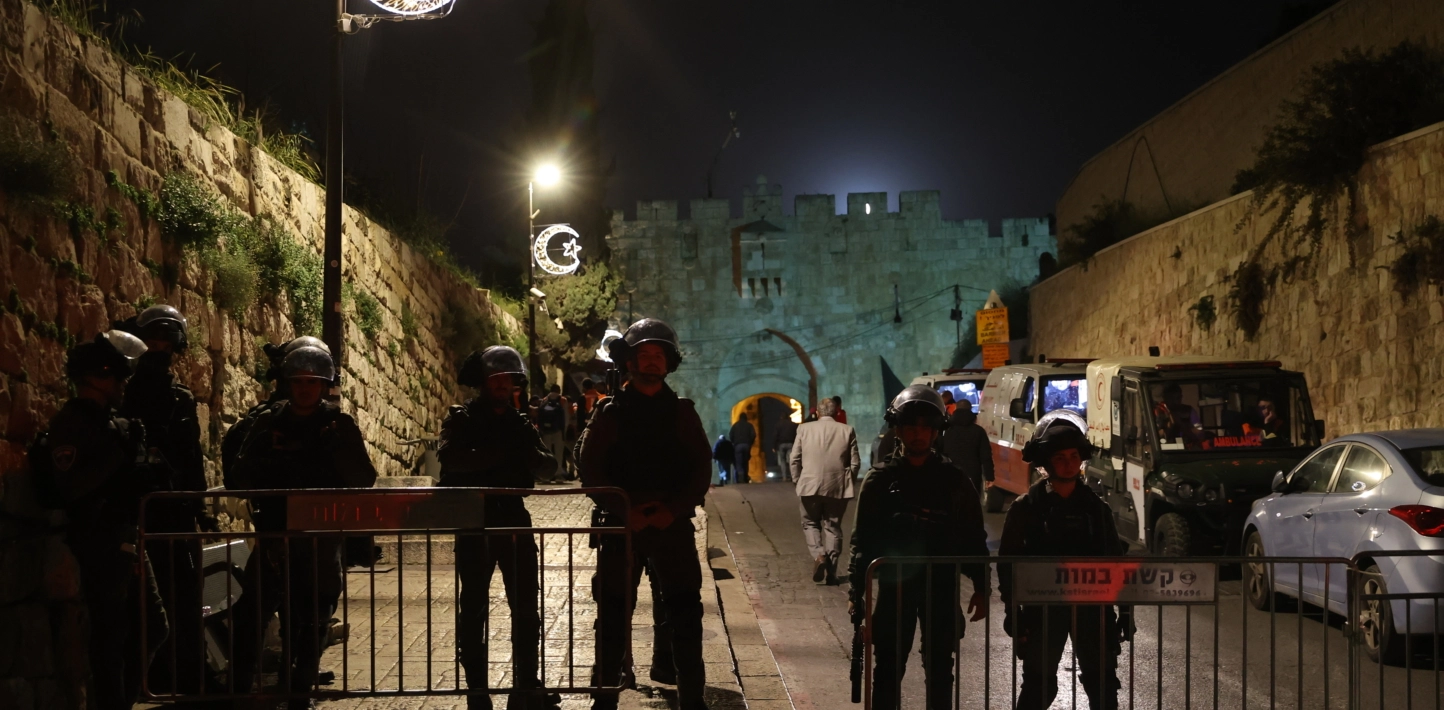
©Anadolu Agency / Contributor/ Getty Images
Israeli forces regularly raid Al-Aqsa during the month of Ramadan. An attack in 2021 left at least 170 Palestinians injured and stirred widespread protests. Following the first raid on Al-Aqsa, protests broke out in several Palestinian cities and towns inside Israel.
Why do you think large segments of the Jewish community are silent when it comes to brutal Israeli aggression against Palestinians?
Jodi Melamed: There is intense group self-regulation. If miseducation doesn’t work, and individual American Jews speak the truth of the severely unequal, aggressively cruel, and deadly treatment of Palestinians in Israel, they are ostracized. If their livelihood depends on the Jewish community, they will very likely lose that livelihood. We need to analyze the social reproduction of cowardice in the Jewish community.
We are familiar with white supremacy—would you consider actions by militant Zionists as an expression of religious supremacy?
Jodi Melamed: Yes, it is a kind of religious supremacy that, in the context of Israeli settler colonialism being a late development of European colonialism, overlaps with white supremacy. The violence of displacement, confinement and removal of Palestinians has always been justified by supremacist racial and colonial logics that dehumanize Palestinians as inferior to Ashkenazi (European) Jews. This new extremist Zionist violence is aggressively ethnonationalist, and in step with ethno-nationalist authoritarian movements in Europe and the U.S. (white Christian nationalisms), India, Russia and elsewhere. Americans need to decry and reject Jewish supremacist aggression in Israel as much as we decry and reject white supremacist aggression in the U.S.
Geoffrey Adelsberg: Many of the rightwing political parties in power today in Israel are clear and explicit about their belief in Jewish supremacy. So, I would certainly describe the actions of militant Zionists as religious supremacists.
Rachel Ida Buff: Religious supremacy and white supremacy—witness attitudes in Israel towards Jews from the Middle East and North Africa—the attitudes towards Palestinian are genocidal and racist.
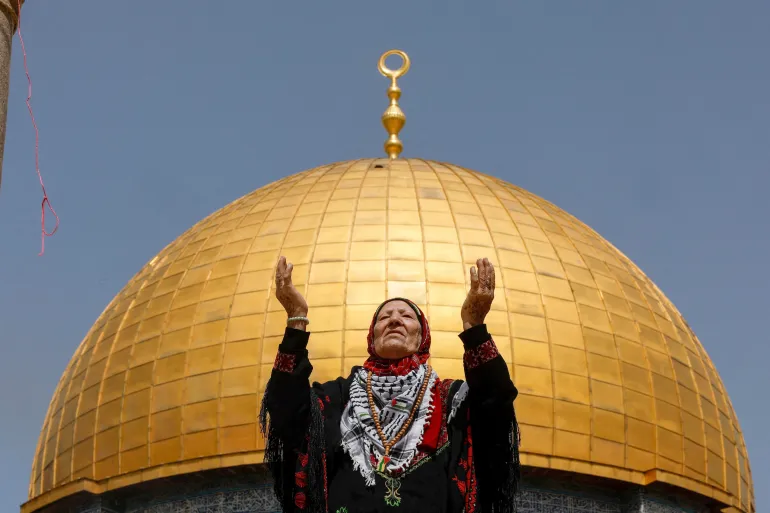
A woman prays on the Al-Aqsa Mosque compound in Jerusalem’s Old City [Ammar Awad/Reuters]
How do you feel about the fact that the government of Israel, the largest international recipient of American tax dollars, more than 3.5 billion per year, has encouraged the expansion of illegal settlements and violation of Palestinian human rights?
Geoffrey Adelsberg: I am deeply disappointed by the blank check that the US extends to Israel; I also believe that the movement for Palestinian human rights has made extraordinary steps towards bringing public awareness to this issue. I am hopeful that our movement can exert pressure to make the availability of this aid conditional on respect for Palestinian human rights.
Rachel Ida Buff: And that this goes on regardless of the party in power. It means we need to double down and keep up the pressure politically in this county.
Some international rights organizations and observers have called Israel an Apartheid state. What are your thoughts?
Jodi Melamed: There is no reasonable doubt that Israel is an apartheid state. Israel’s laws, policies, and practices towards the Palestinian people align with the international legal definition of apartheid. “The crime of apartheid,” as defined in the Rome Statute of the International Criminal Court, “means inhuman acts … committed in the context of an institutionalized regime of systematic oppression and domination by one racial group over any other racial group or groups and committed with the intention of maintaining that regime.”
As U.S.-based groups as diverse as Amnesty International, Human Rights Watch, the American Friend’s Service Committee, and the Presbyterian Church have confirmed and documented, the crimes of apartheid occur in Israel/Palestine in countless ways: establishing two sets of laws, one for Israelis and one for Palestinians, which privilege Israeli Jews and oppress and disfavor Palestinians; restricting Palestinian residence to segregated enclaves; forced removal of Palestinians; expropriating Palestinian land and water for Jewish-only enclaves; deliberate impoverishment of Palestinians and deprivation of economic and social rights; the indefinite detention and torture of Palestinians; and much more.
Unfortunately, the notion of Israeli democracy has always been a cruel hoax to Palestinians. Right now, so-called progressive Israelis are on the streets protesting for apartheid democracy and against apartheid religious authoritarianism. But there are young Jewish Israelis who are learning that there is no such thing as apartheid democracy and turning against the occupation.
Geoffrey Adelsberg: I agree that Israel is an apartheid state. I am heartened by recent reports from B’tselem, Human Rights Watch and Amnesty International affirming this reality, which Palestinians have been calling apartheid for decades.
Rachel Ida Buff: When you are building walls to keep some people in and others out you are pretty close to Apartheid. This is amplified by Israel policy towards the West Bank and Gaza, as well as towards Arabs with Israeli citizenship.
What do you think the solution is?
Geoffrey Adelsberg: The solution is democracy. Democracy in Israel/Palestine that counts Palestinians as equal partners and grants the right of return is challenging for many in my community. I—as well as many others in my Jewish community—are committed to acknowledging/respecting and working to transform the fear that so many in our community feel when confronted with Palestinian demands for self-determination. I wish to work within my Jewish community to build support for the idea that Jewish safety and wellbeing cannot be sustainably achieved through apartheid violence. I wish to build support for the idea that integrity with our traditions, values—especially those that come from our experiences of antisemitism—call on us to respect Palestinian human rights and self-determination.
